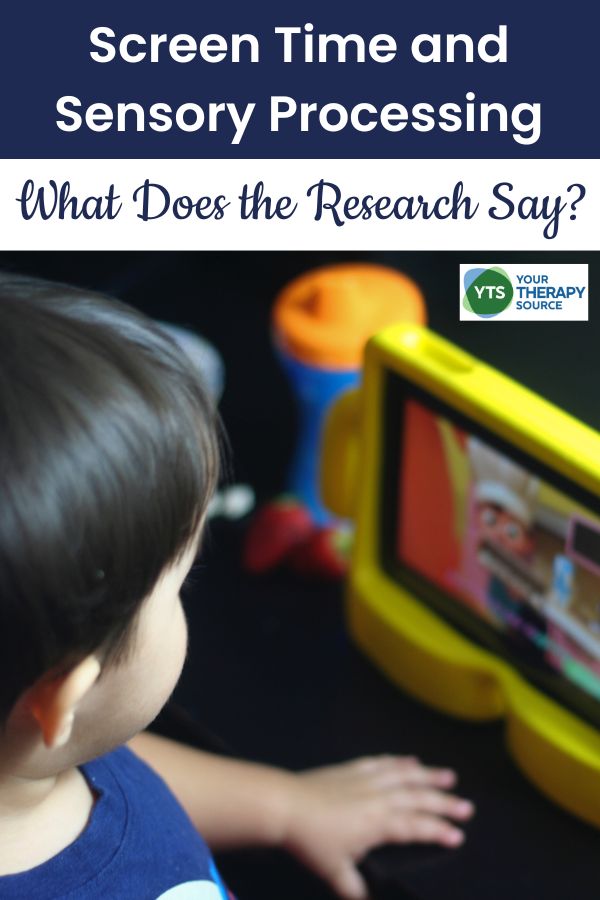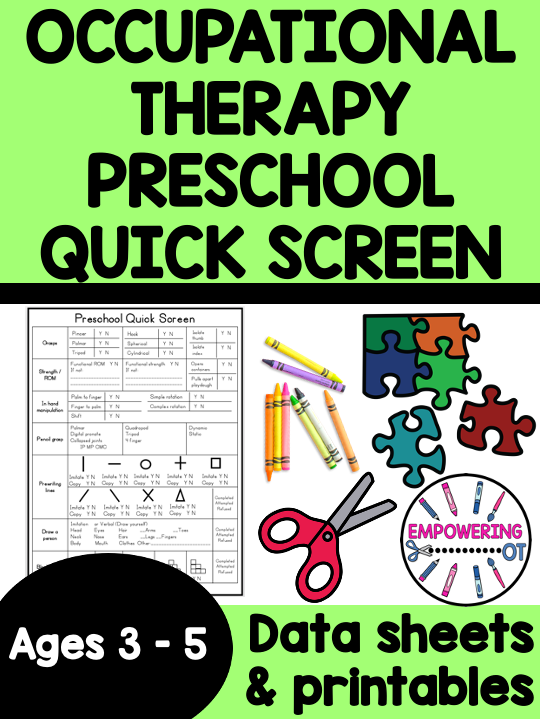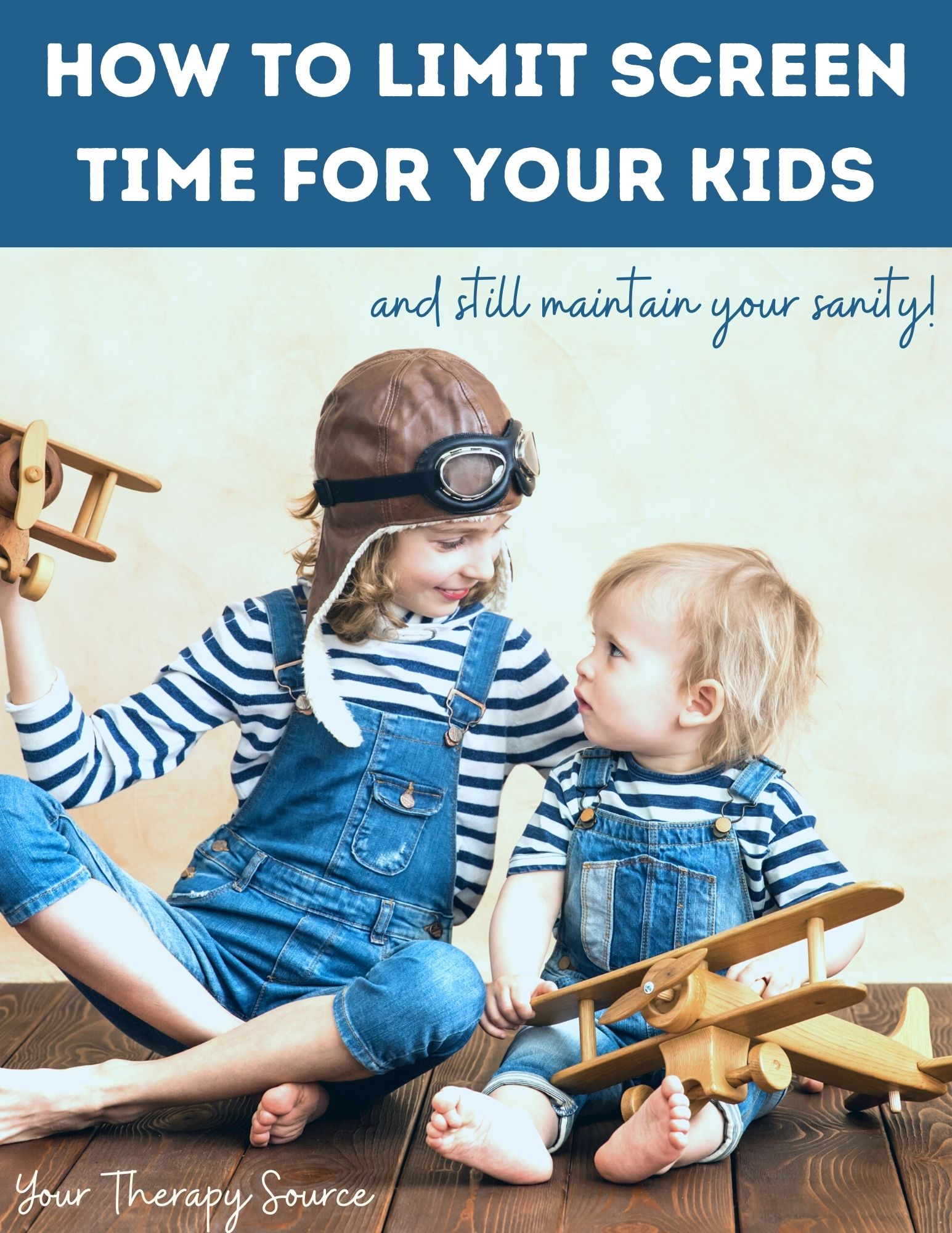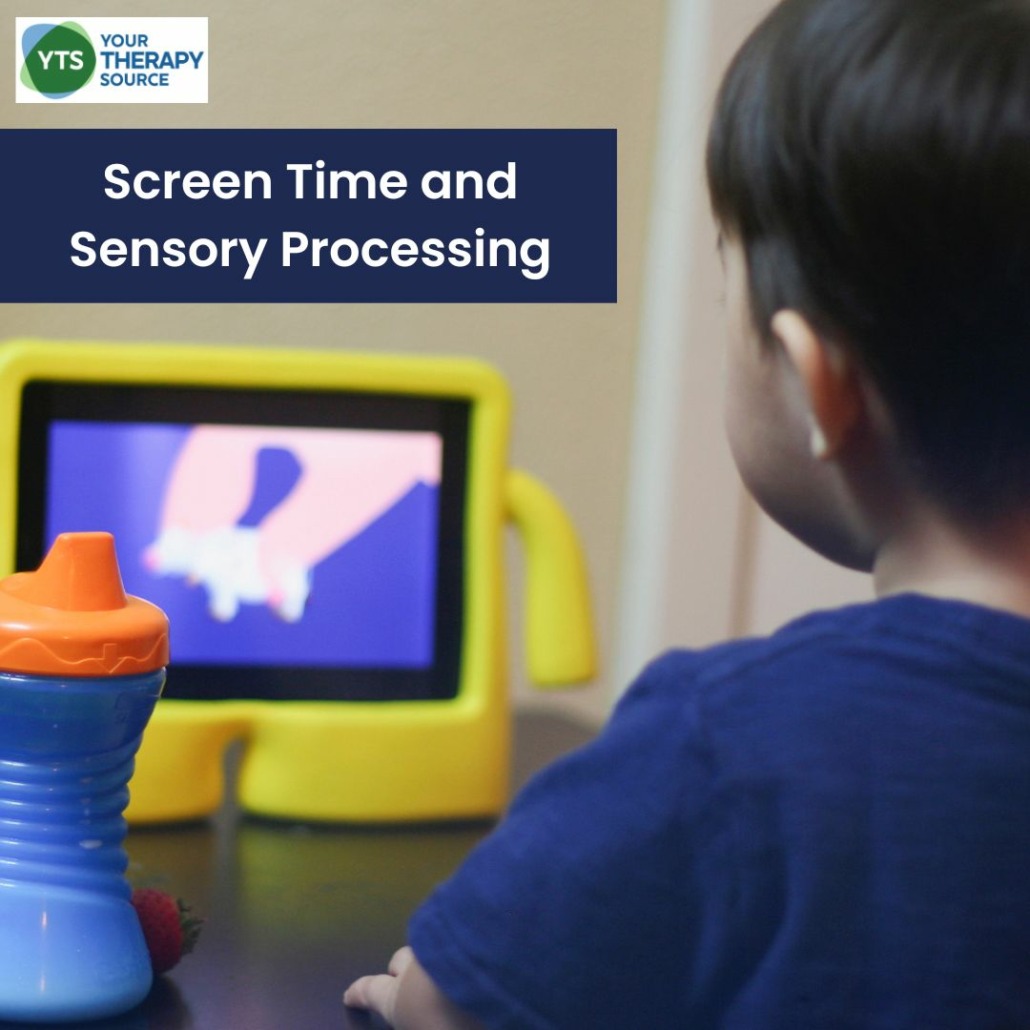Screen Time and Sensory Processing in Children – What Does the Research Say?

In an era where digital screens are ubiquitous in our lives, understanding the impact of screen time on sensory processing in children has never been more critical. Recent research, including a recent study published in JAMA Pediatrics, has begun to unravel how early-life exposure to digital media, such as television and videos, might be associated with atypical sensory processing. Learn more about screen time and sensory processing by taking a closer at the implications of screen time on young minds and bodies.
Would you prefer to listen to this article? Hit play!
Early-Life Digital Media Experiences and Development of Atypical Sensory Processing
The study Early-Life Digital Media Experiences and Development of Atypical Sensory Processing, led by Karen Frankel Heffler, MD, and her colleagues, focused on how screen exposure in the first two years of life could lead to sensory processing issues. Using data from the National Children’s Study, the researchers examined the viewing habits of 1,471 children and their subsequent sensory processing outcomes.

Sensory Tools Visual Supports
Results of the Study on Screen Time and Sensory Processing on Children Two and Under
After data analysis, the study found that:
- screen exposure at 12 months of age was associated with a twofold increased risk of being in the high category of low registration – a sensory processing issue where children are less sensitive or slower to respond to stimuli.
- at 18 months, higher screen exposure correlated with an increased risk of high sensation avoiding and low registration.
- By 24 months, increased screen time was linked to heightened risks of high sensation seeking, sensory sensitivity and sensation avoidance.
These findings are significant, suggesting that early-life screen time might be a potential risk factor for developing atypical sensory profiles. This evidence indicates that early exposure to digital media could potentially contribute to the development of unusual sensory profiles. Additional research is necessary to delve deeper into the link between screen time and specific sensory-related developmental and behavioral outcomes. It’s also important to explore if reducing exposure to digital media in early life could lead to improvements in these sensory-related outcomes.
Activities to Encourage Sensory Input in Young Children
As parents and caregivers, it’s essential to understand the significant role that sensory-friendly activities play in the development of children under two years old. These activities are not only crucial for their sensory development but also serve as healthier alternatives to screen time. Engaging young children in various sensory experiences helps in their overall growth, aids in building neural connections in their brains, and fosters learning and exploration in a natural, playful way. Here’s a list of 20 simple, sensory-friendly activities that are easy to set up and immensely beneficial for young children. Be sure to supervise young children very closely with small objects to prevent choking.
- Texture Exploration: Create a texture board or basket with items of different textures such as soft fabrics, rough sandpaper, and smooth silk for tactile exploration.
- Indoor Water Play: Fill a shallow tray with water and provide cups, spoons, and safe toys for splashing and pouring activities. Add cups and small containers to the bath for water play indoors.
- Finger Painting: Using edible, non-toxic paints or food such as yogurt, let children use their fingers to create art on large sheets of paper.
- Play Dough Fun: Homemade or store-bought play dough is excellent for squishing, rolling, and molding, aiding in fine motor skills.
- Nature Walks: Take walks outside, allowing the child to experience different natural textures like grass, leaves, and tree bark.
- Sensory Bins: Fill a bin with rice, beans, or pasta, and hide small toys inside for children to find.
- Bubble Catching: Blow bubbles and encourage the child to catch them, enhancing hand-eye coordination and visual tracking.
- Sound Bottles: Fill bottles with different items (rice, bells, beads) to create various sounds for auditory exploration.
- Scented Play: Introduce scents using scented play dough or scented markers during craft time.
- Mirror Play: Let children play in front of a mirror to explore their own facial expressions and movements.
- Soft Toy Sort: Sort soft toys by size, color, or type, encouraging cognitive and tactile skills.
- Light Exploration: Use a flashlight in a dim room to create interesting light patterns on the wall or ceiling.
- Textured Balls: Offer balls with different textures and sizes for rolling, tossing, and feeling.
- Fabric Scraps: Provide a variety of fabric scraps (velvet, corduroy, silk) for tactile exploration.
- Feather Play: Gentle play with feathers can be a soothing tactile experience.
- Musical Instruments: Simple instruments like shakers or drums can be a fun way to explore sound.
- Edible Sand: Create edible sand using crushed cereal for safe, sensory play.
- Outdoor Water Play: Head outdoors with various larger water containers to pour and scoop. Play in the sprinkler if it is hot out.
- Sponge Squeeze: Wet sponges in a water tray allow for squeezing, a great activity for fine motor skill development.
- Jumping Activities: Use colored tape on the floor to jump over.
These activities provide engaging, multi-sensory experiences for young children, promoting their development in a fun and interactive way, far away from the passive engagement of screen time.

Occupational Therapy Preschool Screening
Preschoolers’ Screen Time and Motor Development
Another study about Preschoolers’ Screen Time and Motor Development, highlights the correlation between screen time and motor skill development in young children. It suggests that excessive screen time can hinder the physical development of preschoolers, impacting their ability to perform basic motor tasks. Higher media usage led to decreased fine motor skills over time.
Effects of Screen Time on Emotional Regulation and Academics
Research on the Effects of Screen Time on Emotional Regulation and Academics investigated the influence of screen time on children’s emotional and academic outcomes. This study is crucial for parents and educators as it sheds light on how screen time can affect a child’s ability to regulate emotions and perform academically.
Following data analysis, the researchers determined that:
- screen time at 4 years of age was directly, positively and significantly associated with dysregulation.
- screen time at 4 years of age was negatively associated with mathematics and literacy grades at 8 years of age of the child.
The researchers concluded that the results could help establish additional guidelines for the use of digital devices by very young children.
Impact of Outdoor Play
Mitigating Screen Time with Outdoor Play examines how outdoor activities can counteract the harmful effects of screen time. They found that children who spent more than an hour a day on screens at age 2 had lower communication and daily living skills at age 4. Playing outside frequently at age 2 years 8 months helped reduce the negative effects of too much screen time on daily living skills. In fact, 18% of the connection between screen time and lower daily living skills was lessened by playing outside often. Interestingly, playing outside was also linked to better socialization skills, while more screen time was not associated with any changes in socialization.
This study advocates for the benefits of nature and physical play in a child’s daily routine as an alternative to screen exposure. Promoting a healthy balance of age-appropriate activities, limiting screen time, and encouraging social interactions and outdoor play, we can support the optimal development of young children in today’s technology-driven world.

How to Reduce Screen Time for Kids Ebook
Activities to Encourage Sensory Input in Preschoolers
Introducing sensory activities to preschoolers is a wonderful way to foster their development, creativity, and learning. Engaging in activities that stimulate the senses supports their cognitive growth, fine and gross motor skills, and helps them understand and respond to the world around them. Sensory activities are especially beneficial as they can be both educational and fun, providing an excellent avenue for preschoolers to explore, experiment, and learn. Here are 20 sensory activities designed to encourage sensory input in preschoolers:
- Garden Treasure Hunt: Organize a treasure hunt in the garden where children search for natural items like leaves, stones, or flowers of different textures and colors.
- Rainbow Bubble Snakes: Create bubble snakes with a mix of dish soap and water using a sock over the end of a plastic bottle. Add food coloring for a rainbow effect.
- Nature Walk Bingo: Create bingo cards with pictures of birds, insects, leaves, and flowers for children to spot and mark off during a nature walk.
- Outdoor Chalk Art: Provide chunky sidewalk chalk for drawing on pavement or concrete. Create an obstacle course.
- Mud Kitchen Play: Set up a corner in the yard where children can play with mud, using old pots, pans, and utensils.
- Leaf Pile Jumping: Gather a big pile of leaves and let children jump in for a sensory-rich experience.
- Bubble Chase: Blow bubbles and encourage children to chase and pop them.
- Nature Sound Exploration: Spend quiet time outdoors listening and identifying different sounds in nature.
- Rock Painting: Collect smooth rocks and have children paint them with bright colors.
- Stick Fort Building: Collect sticks and branches to build a small fort or sculpture.
- Indoor Obstacle Course: Create a simple obstacle course using pillows, blankets, and furniture to crawl under, over, and through.
- Sensory Rice Bin: Fill a bin with colored rice and hide small toys for a fun discovery game. Supervise closely.
- Shadow Puppet Play: Use a lamp and hand gestures to create shadow figures on a wall, encouraging imagination and visual perception.
- Homemade Sensory Bottles: Fill bottles with water, glitter, beads, and food coloring for a mesmerizing visual experience.
- Balancing Beam: Lay a piece of tape on the floor as a balancing beam for children to walk on, enhancing their motor skills and balance.
- Yarn Maze: Create a maze with yarn across a hallway for children to navigate through, developing their problem-solving skills.
- Fabric Box: Fill a box with fabrics of various textures for children to feel and describe.
- Indoor Scavenger Hunt: Make a list of household items for children to find, encouraging exploration and cognitive skills.
- Building Blocks: Use blocks or Lego for constructive play, enhancing fine motor skills and creativity.
- Flashlight Tag: Play a game of tag where the child with the flashlight has to ‘tag’ others with the light, encouraging active play and coordination.
- This list offers a diverse range of sensory activities that can easily be set up both indoors and outdoors, providing children with enriching and stimulating experiences that aid in their sensory and overall development.
These activities are not only engaging but also help preschoolers in developing a better understanding of their sensory experiences, enhancing their overall learning and growth.
KEY TAKEAWAYS ON SCREEN TIME AND SENSORY PROCESSING
- Early Exposure to Digital Media and Sensory Processing: There is an association between screen exposure in early life and the development of atypical sensory processing. This suggests that reducing screen time in favor of sensory-rich activities could play a crucial role in the healthy sensory development of young children.
- Screen Time Impacting Motor Skills: Research on preschoolers highlights that excessive screen time can negatively impact motor skill development. In contrast, sensory activities, particularly those involving physical movement, can promote better motor skills and physical development.
- Influence on Emotional Regulation and Academic Performance: Screen time has been found to be directly associated with challenges in emotion regulation and academic achievements in children. Engaging in sensory play can help in developing better emotional control and cognitive abilities, essential for academic success.
- Enhancing Neurodevelopmental Outcomes with Outdoor Play: Outdoor, sensory-based activities can counteract the adverse effects of excessive screen time. This underscores the importance of integrating sensory-rich outdoor play in early childhood to support optimal neurodevelopment.
- Diverse Sensory Experiences for Overall Development: Providing a wide range of indoor and outdoor sensory activities offers children diverse sensory experiences that are crucial for the overall development of young children. These activities not only enhance sensory processing skills but also contribute to the development of creativity, problem-solving, and social skills in a way that screen time cannot.
These takeaways emphasize the significance of limiting screen time in favor of sensory-rich experiences, highlighting their role in fostering holistic development in young children. By prioritizing these activities, caregivers can help support the healthy growth and development of young minds and bodies.
ARE YOU CONCERNED ABOUT YOUR CHILD’S SENSORY PROCESSING SKILLS?
Parents and educators who have concerns or questions about a child’s sensory development, should reach out to a pediatrician, occupational therapist, or physical therapist. This is a proactive and beneficial step. These professionals are equipped with the knowledge and experience to provide comprehensive evaluations and insights into a child’s sensory processing and motor skills. Whether it’s to address specific concerns or to seek guidance on the best sensory-rich activities and interventions, their expertise can be invaluable in supporting a child’s development. An evaluation can also help in identifying any underlying issues early on, ensuring that children receive the appropriate support and resources they need to thrive. Remember, seeking professional advice is a sign of attentiveness and commitment to a child’s well-being and development.
REFERENCES FOR THIS POST ON SCREEN TIME AND SENSORY PROCESSING
Cerniglia, L., Cimino, S., & Ammaniti, M. (2020). What are the effects of screen time on emotion regulation and academic achievements? A three-wave longitudinal study on children from 4 to 8 years of age. Journal of Early Childhood Research, 1476718X20969846.
Heffler KF, Acharya B, Subedi K, Bennett DS. Early-Life Digital Media Experiences and Development of Atypical Sensory Processing. JAMA Pediatr. Published online January 08, 2024. doi:10.1001/jamapediatrics.2023.5923
Martzog, P., & Suggate, S. P. (2022). Screen media are associated with fine motor skill development in preschool children. Early Childhood Research Quarterly, 60, 363-373.
Sugiyama, M., Tsuchiya, K. J., Okubo, Y., Rahman, M. S., Uchiyama, S., Harada, T., … & Nishimura, T. (2023). Outdoor Play as a Mitigating Factor in the Association Between Screen Time for Young Children and Neurodevelopmental Outcomes. JAMA pediatrics.



